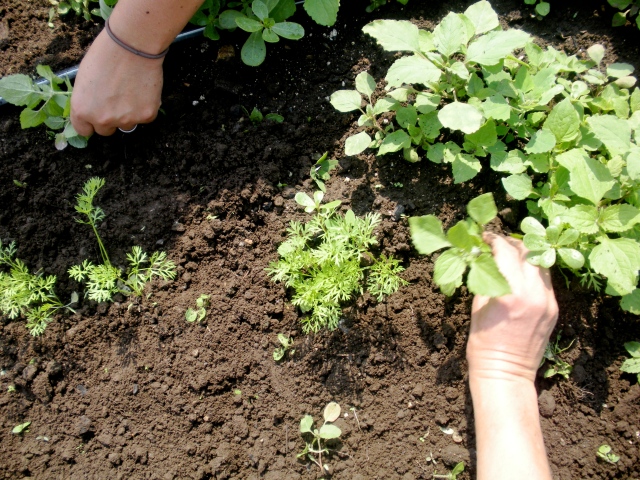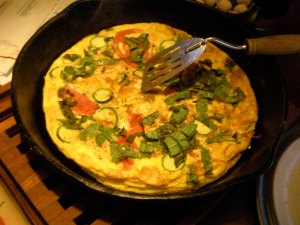“Weeds are flowers too, once you get to know them.” – A. A. Milne
In my time working in the fields, I’ve become familiar with weeds. Among the most common are ragweed, smartweed, horseweed, foxtail, galinsoga, crabgrass and horse nettle. (A helpful guide to common weeds in CT can be found here.) While I can’t quite agree with Milne on the perceptive physical beauty of weeds, I do admire them for their tenacity and perseverance.
Some weeds, including chickweed, lamb’s quarters and purslane, are edible and have medicinal benefits, so I don’t completely despise them. Some are just amazingly adaptable and vigorous, like many pigweeds. Pigweed thrives in hot weather (um, like the entire growing season!), competes with warm season crops for available nutrients and resources, and reproduces seeds prolifically. Just when you think you have a hold on the fields, the weeds are always there!

Carrot weeding time. (Hunts Brook Farm, August 2013 ~ A. Gross)
This, however, is what you sign up for when you grow using mindful, organic practices and do not utilize synthetic herbicides to suppress weeds. It’s part of the routine. As time consuming as weed cultivation is, there’s something almost comical and profound about it. It’s sort of a clumsy, seasonal dance between the plant and human communities. After spending, for example, three hours hand-weeding a bed of carrots, hoeing brassica rows or pulling invasives from greenhouse edges, weeds will appear in the same spot a week later. Humans have this odd perception that we are the great controllers of it all, that we have some sort of dominion over other ecosystems. I can confidently say that this mindset is not realistic and a bit delusional. Persistent weeds, even those that can be consumed, are proof that they ultimately win the superiority, survival-of-the-fittest fight.
I don’t want to end this week on a completely defeatist tone because, well, weeding is one of my favorite jobs. (Gasp!) Why? Well, my reasoning is sort of selfish. It’s a job that involves tangible* gratification (*notice that I didn’t write “instant”…). When you look back on a once daunting, weed-laden bed, you can give yourself an internal pat on the back (or, if working with other individuals, actual high fives might be exchanged), and realize that you helped to save a crop that day.
So, here’s to embracing or, at least, tolerating our weedy counterparts, and on behalf of the HBF crew,
CSA Week 11 ~ August 28, 2013
The goodness this week:
- lettuce
- kale
- Swiss chard
- herbs
- summer squash and/or zucchini
- carrots or beets
- kohlrabi
- garlic
- onions
- tomatoes
- peppers
- eggplant
- spaghetti squash!
- hot peppers
Recipes, tips & suggestions:
- With a guiding theme of simplicity this summer, we can’t help but share the deliciousness that is the frittata, especially when you use local eggs produced by happy hens. (And, how convenient that we sell Terra Firma Farm eggs in our stand!) Frittatas are incredibly versatile, can be eaten any time of day and with any ingredients that you have on hand. Here are some basic, healthful recipes from Cooking Light.

Recipes on file: The summer vegetable frittata
- You’ll also be getting spaghetti squash this week. Never cooked it? Well, you’re in for a treat! Check out this blog post on the many ways to enjoy this delightful winter squash.
Happy cooking!

